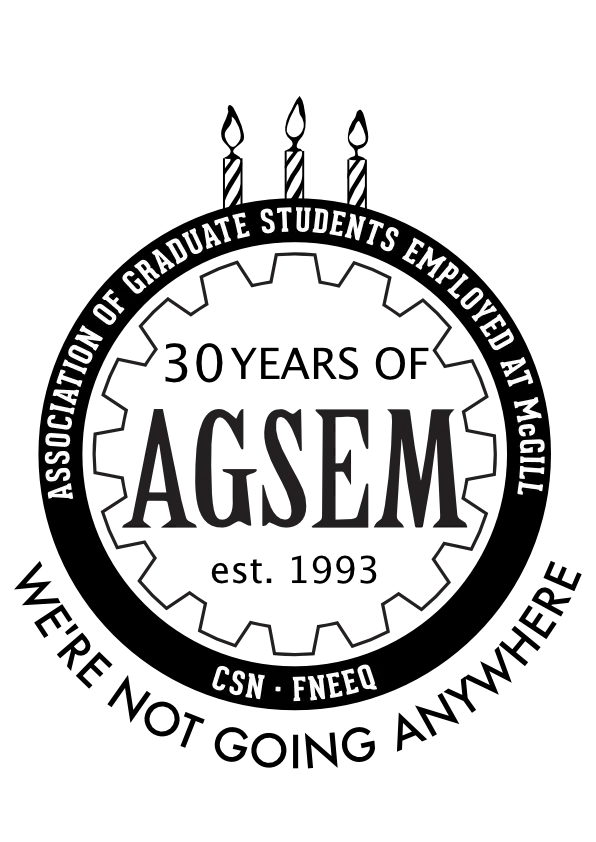Exhibit 1 - McGill Graduate Labour Organizing (1974-1992)
Location of physical exhibit: Take the left hallway off the lobby of the McCall MacBain Arts Building. The AGSEM bulletin board is on the left side of this hallway near the English Department.
While AGSEM was officially accredited in 1993, the history of graduate student worker organizing at McGill begins in the 1970s with the McGill Teaching Assistants’ Association. The AGSEM archival records offer insights into the initiatives that established the foundations for the union to take shape.
McGill graduate students involved in early organizing efforts for Teaching Assistants drew inspiration from widespread unionization campaigns at universities across Canada. In 1975, the Ontario Labour Relations Board (OLRB) confirmed that teaching assistants are employees and have the right to organize and bargain collectively (Graduate Assistant’s Association v. York University, OLRB Decisions, September 1975). While successful unionization efforts emerged mainly at universities in Ontario and British Columbia in the 1970s and 1980s, students at McGill formed the McGill Teaching Assistant’s Association (MTAA) in 1974 to advocate for graduate student workers on campus.
The MTAA facilitated successful advocacy projects and brought attention to the concerns of Teaching Assistants at McGill. While it was not legally certified as a labour union, the MTAA’s activists, with very serious concerns, succeeded in forcing McGill to begin negotiating on the issues affecting graduate student employees.
![The McGill Teaching Assistants Association [MTAA] Constitution (1976). AGSEM Archives, Vol. 3.1 “MTAA Early Negotiation Documents.”](/images/AGSEM%20anniversary/mtaa-constitution_hudfe626a10d3b2915d717401755db0a81_55720_0x0_q75_h2__2.webp)
The McGill Teaching Assistants Association [MTAA] Constitution (1976). AGSEM Archives, Vol. 3.1 “MTAA Early Negotiation Documents.”
“Teaching Assistants, by virtue of both their education and the many hours of preparation they must spend specifically in fulfillment of their jobs, are an integral part of the teaching staff at the University, a part which could not be eliminated without gravely prejudicing the quality of undergraduate instruction…"
—McGill Senate Report of the Ad Hoc Committee to Investigate the Employment of Graduate Students in a Teaching Capacity, December 17, 1975.
In response to the formation of the MTAA, the McGill Senate created the Ad Hoc Committee to Investigate the Employment of Graduate Students in a Teaching Capacity. The Committee presented a report to the Senate in December 1975. The report concluded that TAs were an integral part of the teaching staff at McGill and made several recommendations, including a 12-hour work week, and yearly cost-of-living increases comparable to other staff. Despite the seemingly supportive intent of this committee, the agreements were not respected by McGill. Ultimately, waiting for the employer to make good on their broken promises stalled efforts of McGill TAs to unionize.
“In addition we urge that members of the Senate undertake to use their influence to ensure that the stipends of Teaching Assistants are at a level commensurate with the responsibilities undertaken by them, and competitive with similar positions at comparable Canadian universities, and to ensure, further, that the salaries of Teaching Assistants are indexed or augmented so as to increase as the cost-of-living increases, in a manner comparable to the salaries of full-time staff.”
—McGill Senate Report of the Ad Hoc Committee to Investigate the Employment of Graduate Students in a Teaching Capacity, December 17, 1975.
When McGill failed to implement the Senate resolution due to the non-binding nature of the report, MTAA took action. From February 2 to 12, 1976, the MTAA held an illegal 8-day strike. This was the first strike of Teaching Assistants in Québec. Almost three decades before another TA union was founded in Quebec, the MTAA won the promise of major concessions from McGill: a base pay rate for all TAs, cost of living increases and a maximum 12-hour workweek.
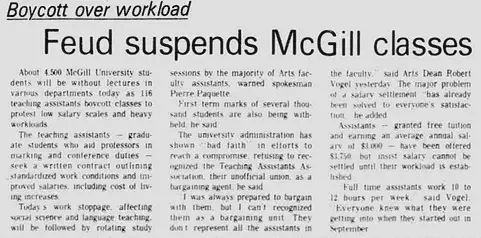
“Boycott over Workload. Feud suspends McGill classes.” Montreal Gazette (February 4, 1976), 3.
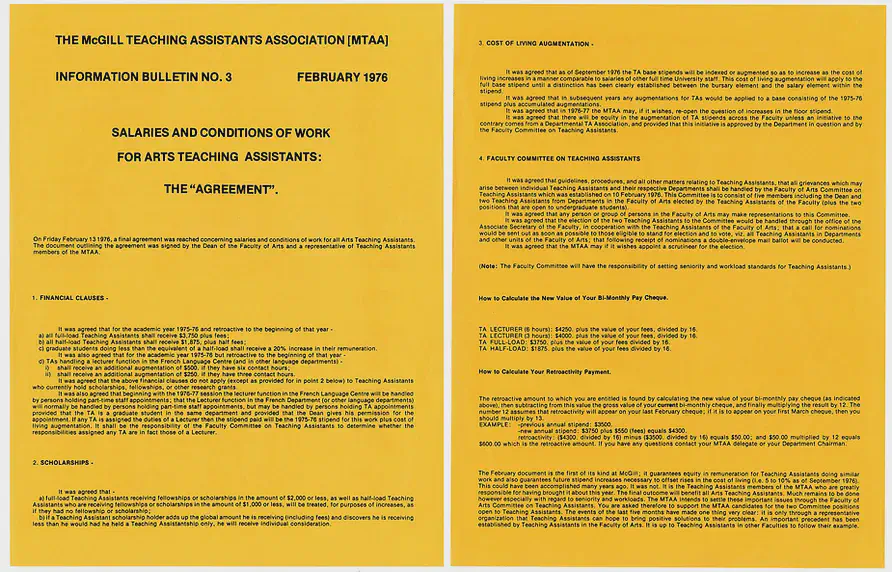
MTAA Information Bulletin No. 3 (February 1976), AGSEM Archives, Vol. 3.1 “MTAA Early Negotiation Documents.”
Despite major victories, the MTAA faced a number of challenges, as McGill frequently went back on the non-binding deals to which it had previously agreed. In the 1980s, graduate student activists, concerned about the situation of Teaching Assistants, began discussions about legal certification as a union, partly as a response to changing labour law in Québec. Galvanized by a strike of McGill maintenance workers, the MTAA threatened to unionize in January 1980. With this, the university’s memory was refreshed and the Senate Ad Hoc Committee reconvened. They reached an agreement with the MTAA on the following: establishing Faculty of Arts TA Guidelines and instituting a first and only cost-of-living allowance, initially promised in 1975.
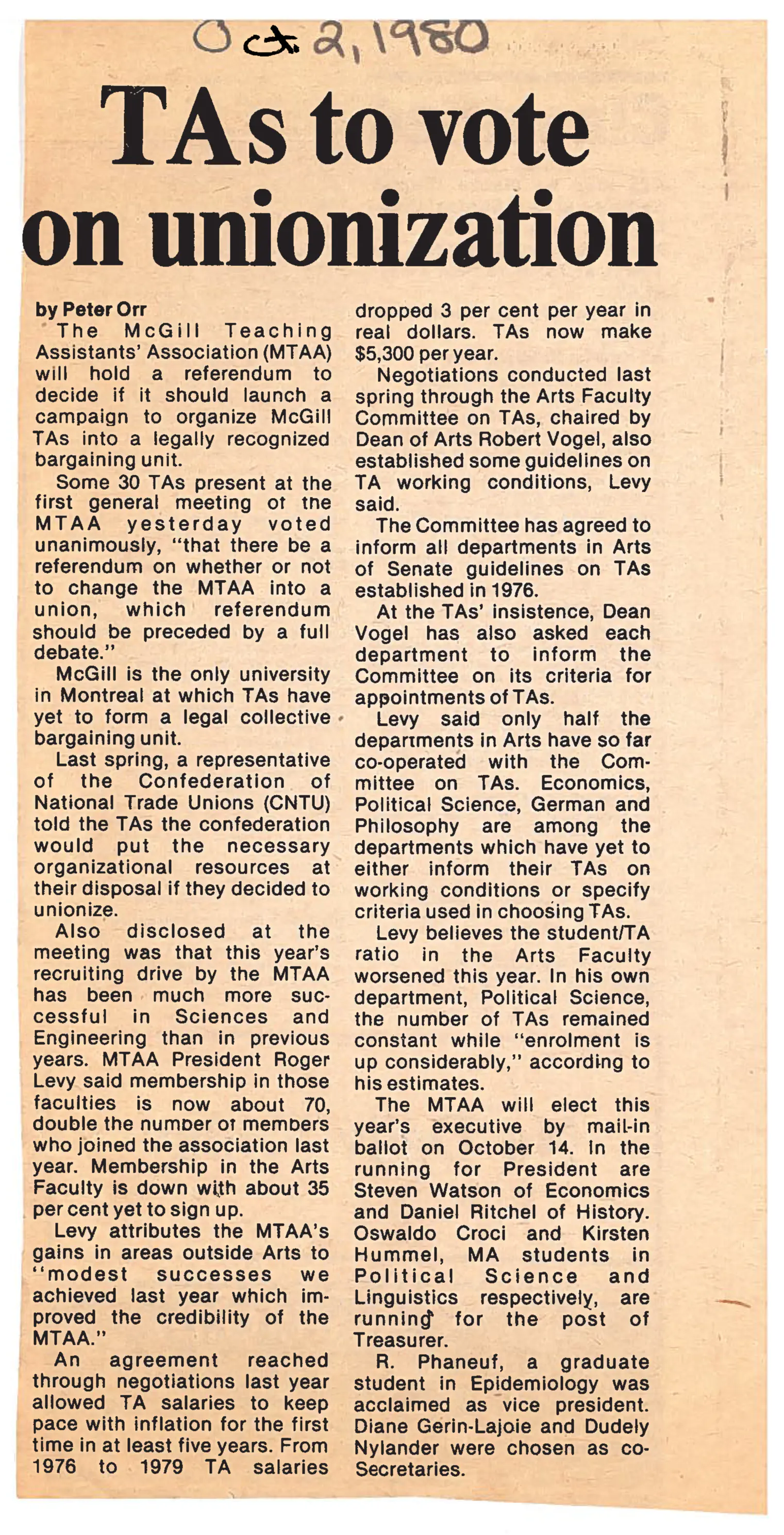
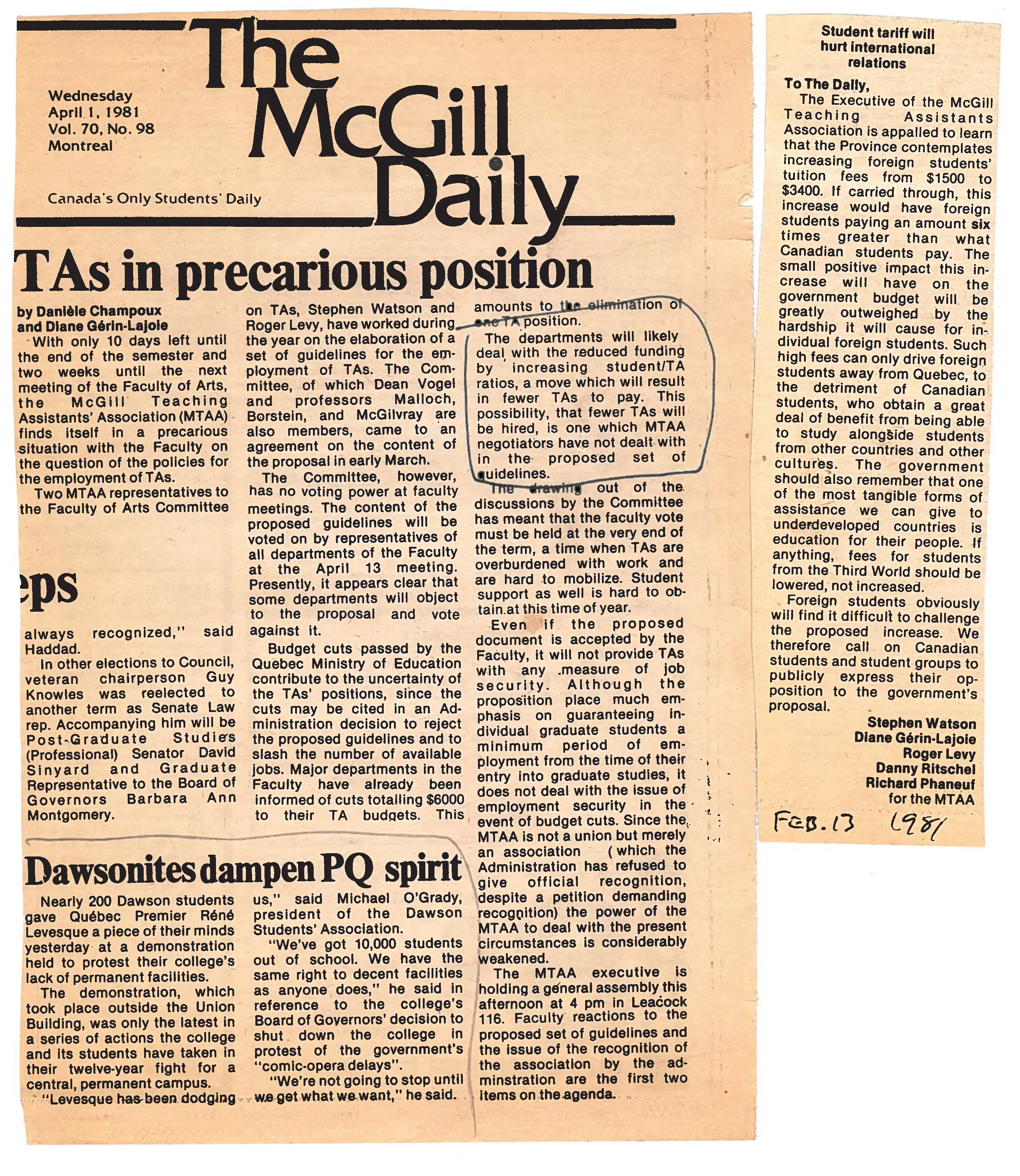
From its inception the MTAA was involved in multiple causes affecting graduate students and TAs (1980-81). AGSEM Archives, Vol. 4.1 "Student Strikes in the Press."
![The McGill Teaching Assistants Association [MTAA] Newsletter Vol. 2 No. 1 (1980). AGSEM Archives, Vol. 3.1 “MTAA Early Negotiation Documents.”](/images/AGSEM%20anniversary/mtaa-flier_hu838dce672eeb1d74ccbd7ad91bfeeaca_127764_0x0_q75_h2__2.webp)
The McGill Teaching Assistants Association [MTAA] Newsletter Vol. 2 No. 1 (1980). AGSEM Archives, Vol. 3.1 “MTAA Early Negotiation Documents.”
Through the 1980s, however, the MTAA lost momentum as its organizing base was primarily limited to the Faculty of Arts and progress stalled on improving the working conditions for all Teaching Assistants. As a result, the Post Graduate Students’ Society (PGSS), the graduate student association of McGill, took up the mantle of advocating for graduate student employees. McGill history student and former PGSS executive David Schulze conducted a survey of TA working conditions and produced the Schulze Report (1986), which suggested a “discouraging” situation for TAs and recommended unionization. In response, the PGSS established the Teaching Assistants’ Organizing Committee (TAOC) to field grievances from McGill TAs. Unfortunately, decentralized negotiations among different faculties, the turnover of PGSS representatives, and the lack of progress with management disrupted the TAOC. By the late 1980s, the difficult work of unionizing TAs was determined by graduate students to be unrealistic. The idea for a TA union was revived again by the PGSS in 1990.
“The lessons of our history are obvious: unless we organize and maintain constant vigilance over our employers we shall not even succeed in attempts to preserve our existing advances.”
—Schulze Report, 1986.
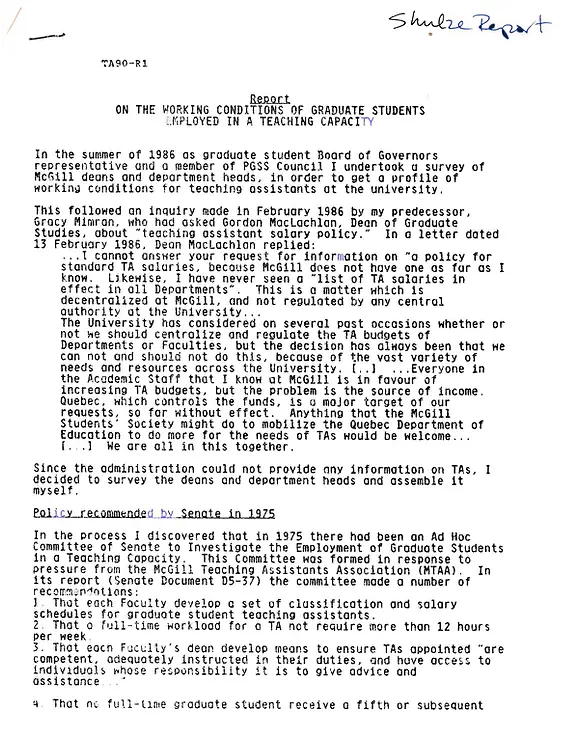
One of the MTAA’s principal goals was fighting for TA pay to be uniform across the university. When the McGill administration could not provide information about pay, the PGSS commissioned David Schulze to investigate. AGSEM Archives, Vol 7.1 “Report on the Working Conditions of Graduate Students Employed in a Teaching Capacity.”
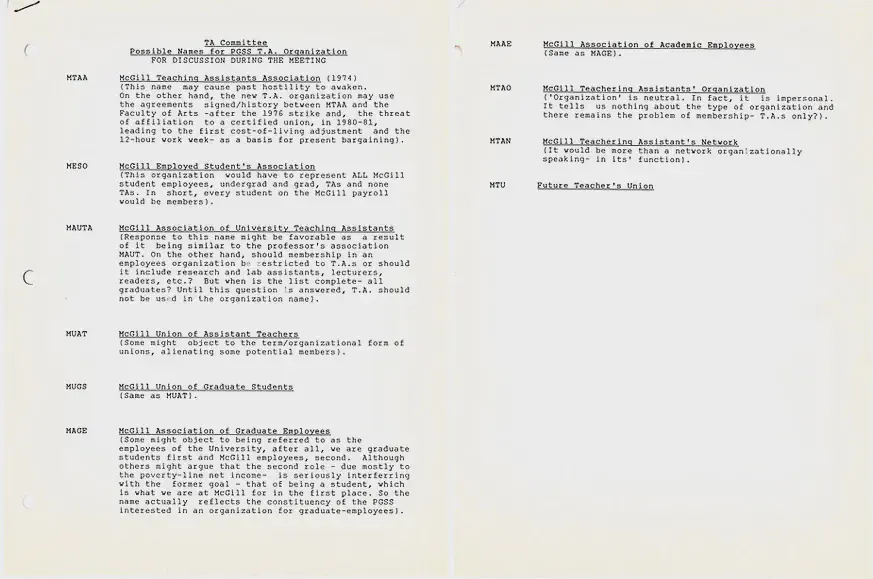
List of Potential Names for a new TA Organization (n. d.). AGSEM Archives, Vol. 5.2 “Early MTAA Files.”
